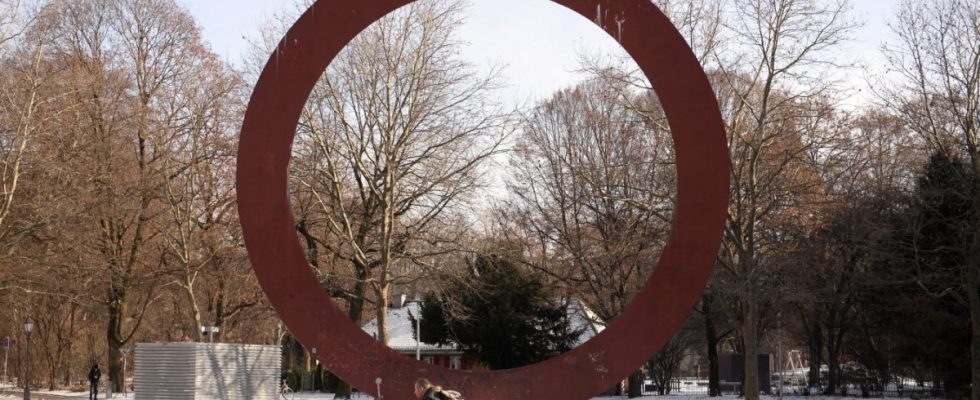The Munich police will monitor the Old Botanical Garden with video cameras in the future – thereby making this inner-city “hot spot” safer. When presenting the 2023 crime statistics on Thursday, Police Commissioner Thomas Hampel emphasized that people’s sense of security depends not only on the number of crimes, but also on how well the police manage to maintain public order. According to Hampel, litter and neglect, vacancies and large construction sites contribute to many people feeling increasingly unsafe.
According to the police headquarters, Munich is the safest major city in Germany for the 48th time in a row. And this despite the number of total crimes increasing by 10.9 percent compared to 2022 to 101,539. In a ten-year comparison, the current figures still represent a decline of 6.6 percent. Shoplifting, so-called brutality crimes and drug abuse caused the curve to rise again last year after a dip caused by corona. In many areas of crime, the number of crimes has apparently increased less than the number of reports filed.
This is particularly true for drug-related crime, a so-called control crime, in which the statistics almost exclusively include cases that the police previously noticed during controls. Hampel did not speak of an “alarm signal for Munich,” as Manuel Pretzl, the parliamentary group leader of the CSU and the Free Voters in the city council, put it in an initial statement at midday. “In Munich and the surrounding area you can not only feel safe, but also live safely,” he writes in the foreword to the crime statistics, which are also published in the Internet is visible. A look at the most important numbers:
The key data
The Munich police were able to improve their clearance rate to 62.2 percent. The frequency figure, i.e. the number of crimes per 100,000 people, is 5,402, 9.1 percent higher than in the previous year. Ten years ago, however, this figure was still at 6,217. Every eleventh recorded crime is shoplifting, an increase of 1,741 to 8,836 cases was recorded. The number of crimes described as “crude crimes” such as robbery, bodily harm, coercion or threats has also increased by 2,233 crimes. In particular, the number of simple physical injuries rose by 15 percent to 8,867 offenses. “The violence is increasing,” said Hampel, describing a development that can be observed nationwide.
Suspects
According to statistics, a total of 63,176 cases from the city and district of Munich were resolved in 2023. 46,523 suspects could be assigned to these crimes. According to the security report, a “disproportionate number” of crimes in Munich are committed by multiple and intensive offenders. 3.5 percent of all suspects are responsible for almost 20 percent of the crimes solved. 48.7 percent of the suspects did not have a German passport, the proportion is “in line with the long-term average,” as Hampel said: “Contrary to the Bavaria-wide trend, crimes committed by immigrants do not play a major role.” 4,640 suspected immigrants were identified; their proportion even decreased slightly, from 10.1 to 10.0 percent. The main crimes recorded were theft and brutality, the victims of which were often immigrants, as well as fare evasion.
Juvenile crime
At 9.8 percent, the increase in suspects under the age of 21 was slightly lower than the overall increase in suspects. Their share of all suspects is 20.1 percent. What is striking is that the police registered significantly more children as suspects in a ten-year comparison – almost half more than in 2014. Children, young people and adolescents committed more robbery crimes than ever before in the past ten years. The number of suspected robbers under 21 increased by 47.5.
Drug offenses
A total of 9,783 drug offenses were registered in the Munich police headquarters area in 2023. The increase of 12.5 percent is also likely to be due to increased police controls at the scene hotspots of the main train station (1,026 cases), Alter Botanischer Garten (790 cases – almost tripling the previous year’s number) and Sendlinger Tor / Nußbaumpark (175 cases). Consumers were caught in 8,376 cases. In particular, the consumption of cannabis, cocaine, heroin and amphetamines has increased. Police Chief Thomas Hampel doesn’t believe in the planned release of cannabis. He fears that the drug will be “trivialized.” And he doesn’t believe that the change in the law will make the police’s work easier – on the contrary: “Monitoring a large number of regulations” will bring “more work and more problems” for the officers. As has become clear elsewhere, they are already pushing 700,000 hours of overtime in Munich.
Political crime
“Violence – figuratively speaking – also takes place in people’s minds,” said the police chief. Hate crime cases increased sharply – by 45.7 percent within a year. The majority of the 603 hate crimes registered by the police were committed by right-wing politically motivated criminals. However, the wars in the Middle East and Ukraine also caused an increase in the number of hate crimes based on foreign and religious ideologies. A total of 683 crimes from the right-wing spectrum were recorded, one hundred more than in the previous year. Of these, 66 were violent crimes. 27 arrest warrants against right-wing extremists are still outstanding. The number of crimes attributed to the left spectrum fell to 287 (minus 9.7 percent). Among the 41 left-wing violent crimes is a series of arsons committed against construction machinery and infrastructure facilities. 156 crimes were committed on the basis of foreign ideologies; another 67 were motivated by religion, predominantly Islamism. The background to most of the crimes is the Middle East conflict following the terrorist attack by Hamas, which is why Munich Jews were targeted. “Our line remains: zero tolerance for hatred and agitation on the streets and online,” announced Police Chief Hampel.

